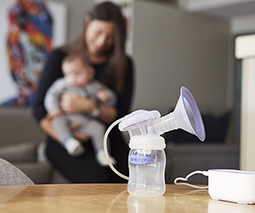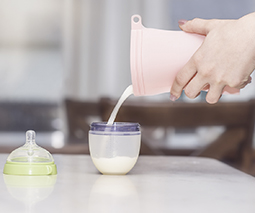Why you need a lactation consultant (and what they do to help)
I remember people talking about lactation consultants when I was in early pregnancy and having so much birth-related stuff in my head, it was all a bit overwhelming. Until, months later when I was home with a screaming baby, sore boobs and worried sick I was doing something wrong.
Georgina Dowden has been a lactation consultant for over ten years, she says aiming to see someone while you’re still pregnant is a good game plan.
“I see some women antenatally – usually ones who have had breastfeeding difficulties with their first baby and want to do everything they can to avoid those same issues the second time around,” says Georgina.
“I am always happy to help a woman come up with a breastfeeding plan to take into hospital with her, as this can help everyone get off to a good start with feeding.”
Read more about breastfeeding:
- Still breastfeeding your toddler? Tips for cancelling out the naysayers
- Liquid gold: Breastfeeding healed my stretch marks
- Pinky McKay: Learn to breastfeed before baby comes along
Why you should learn all you can about breastfeeding
Georgina advises new mums who want to breastfeed to put as much time and energy into learning about it, as we do labour and birth.
“Especially for women who have never seen another woman breastfeed a baby – and many haven’t, they should be getting onto YouTube and watching videos,” says Georgina.
“I encourage women and their partners to read and learn about the natural feeding reflexes of babies. To tell their midwives and support people that they want skin-to-skin contact as soon as possible after birth. They should also insist that baby be allowed to seek the breast themselves (breast crawl), avoiding as much hands-on interference from others as possible.”
Georgina also says it’s important that once the baby is born, he spends as much time as possible nestling onto his mother’s chest.
“This is the place babies learn to breastfeed – not lying swaddled in the bassinet beside the bed!”
A holistic approach to maternal health
When a woman has difficulties breastfeeding Georgina considers all aspects of her life and support networks.
“Her overall health, family’s health, relationship, family support, living situation, cultural background … all these things can have an impact on a mother in the postnatal period. I also find it very useful to explore expectations and preconceived ideas of infant feeding and behaviour with the woman and her family,” says Georgina. “Sometimes fixing the problem is as simple as offering education on what is normal and helping the family to adjust their expectations of their baby.”
How much does ‘rest’ play a part in a woman’s milk supply?
As a new mum, you are told so often to rest as much as possible. As Georgina says while this notion of having weeks snuggling with a baby sounds great, it’s far from possible for most women.
“Rest is so important to a woman after she has had a baby … however, as wonderful as this notion is, it’s just not realistic for every family. Many partners go back to work shortly after a baby is born and women need to run around after their older children, sometimes with limited support from family and friends. So, if rest were *necessary* for milk supply, the human race would be doomed!”
Are there really certain foods we can eat to boost our milk supply naturally?
A well-balanced diet is important for overall health of the mother and the baby, but Georgina says maintaining a great milk supply is a little more complicated than that for some women.
“Some foods are heralded as galactagogues, meaning that eating them may assist in boosting a woman’s milk supply. However, the most important factor in increasing milk supply is removing milk from the breast frequently and effectively,” says Georgina. “If a woman’s baby isn’t feeding properly, then her supply will suffer regardless of what food she eats, or herbs or medications she takes to try to increase her supply.”
And when it comes to mothers of twins and triplets who want to breastfeed, this advice is even more important.
“Mums of multiples have the same challenges as mums of singletons … but doubled, or tripled! They often need more family and practical support. This is especially true for mum’s who wish to exclusively breastfeed their babies on demand. It’s definitely challenging, but also possible,” says Georgina.
Lactation consultants help with general parenting, too
Georgina says that lactation consultants also have a broad understanding of general infant behaviour, so they can provide help with general sleep and feeding behaviour. Plus, they are also qualified to help with older babies and toddlers, too.
“One of the most common breastfeeding concerns I have been seeing women for recently is actually night weaning of toddlers! At the opposite end of the spectrum are problems in the early weeks and months. “








 • When it's 9.40am and you have an appointment for a bit of #selfcare at 10.00am… but you still haven't showered and #sleepingbaby won't let go of your nipple… ? Oh well, such is life with a small human ?•
• When it's 9.40am and you have an appointment for a bit of #selfcare at 10.00am… but you still haven't showered and #sleepingbaby won't let go of your nipple… ? Oh well, such is life with a small human ?•




